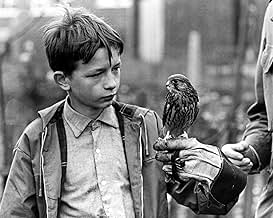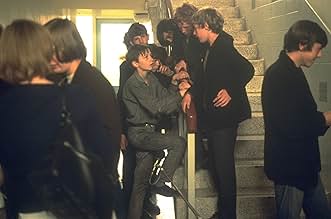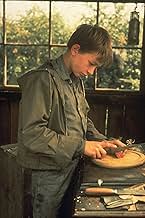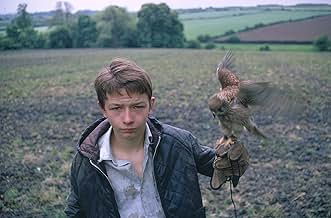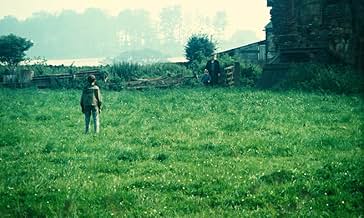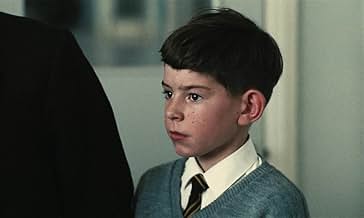A working-class English boy spends his free time caring for and training his pet kestrel.A working-class English boy spends his free time caring for and training his pet kestrel.A working-class English boy spends his free time caring for and training his pet kestrel.
- Won 2 BAFTA Awards
- 6 wins & 5 nominations total
Zoe Sunderland
- Librarian
- (as Zoe Sutherland)
Storyline
Did you know
- TriviaAccording to a BBC Radio 4 interview, the child actors were actually caned on the hand by school headmaster (who was the real school headmaster). They were paid an additional 10 shillings or 50p (about £8.28 in 2020) for their troubles.
- GoofsWhen Mr Sugden is dancing down the pitch in the early part of the match, he shouts various instructions and admonitions to Speed. Speed was on Tibbutt's team and was his first choice.
- Crazy creditsThe majority of the crew were listed simply under the heading "This film was made by..." without each person's specific job title (director of photography, sound recordist, editor etc) being given.
- Alternate versionsSome scenes, including the opening scene and the scene when Jud bullies Billy for having a book, were re-dubbed for the American market to be in a more understandable form of English for Americans. This soundtrack was then used in the UK market for VHS and DVD releases in the 1980s and 1990s, but the 2011 DVD and Blu-Ray releases use the original soundtrack in Yorkshire dialect.
Featured review
Although Kes was not Loach's first film (he had made "Cathy come home" for television and "Poor Cow") it is probably his best both artistically and historically. Historically, the film is an important one, because it's the first one that gives an accurate description of a working-class environment. There had been several social realist movies made before it, such as Karel Reisz's "Saturday Night and Sunday Morning" or Tony Richardson's "Billy Liar", but Kes set a whole new agenda. Esthetically, Loach went a lot further than those before him, filming his characters in a quasi-documentary way. Also, the actors were, for a great part, non-professionals, which lent a further "realistic" touch to the film. For the first time, strong regional accents (Yorkshire) were allowed to flow freely. Finally, the story itself is extremely compelling. Without being at all demonstrative or heavy, the film is the most powerful indictment of the british class system that has ever been recorded on film.
Billy Casper, the hero, is shown to have absolutely no chance of escaping his harsh milieu. At home, his half-brother bullies him and he finds no comfort from his mother. At school the behaviour of teachers, career-councillors and headmasters ranges from violent to merely condescending. It's this anti-institutional side to the film that makes it so powerful. Billy basically knows that he'll probably end up down the mine and he knows that school isn't there for his pleasure or his fulfillment but to tell him what to do. So, unable to express himself at home or at school, Billy develops a passion for hawks and devotes great time and effort to the taming of a kestrel. This passion comes to symbolise both the boy's hopes and his identity.
Billy Casper, the hero, is shown to have absolutely no chance of escaping his harsh milieu. At home, his half-brother bullies him and he finds no comfort from his mother. At school the behaviour of teachers, career-councillors and headmasters ranges from violent to merely condescending. It's this anti-institutional side to the film that makes it so powerful. Billy basically knows that he'll probably end up down the mine and he knows that school isn't there for his pleasure or his fulfillment but to tell him what to do. So, unable to express himself at home or at school, Billy develops a passion for hawks and devotes great time and effort to the taming of a kestrel. This passion comes to symbolise both the boy's hopes and his identity.
- How long is Kes?Powered by Alexa
Details
Box office
- Gross worldwide
- $79,751
Contribute to this page
Suggest an edit or add missing content






